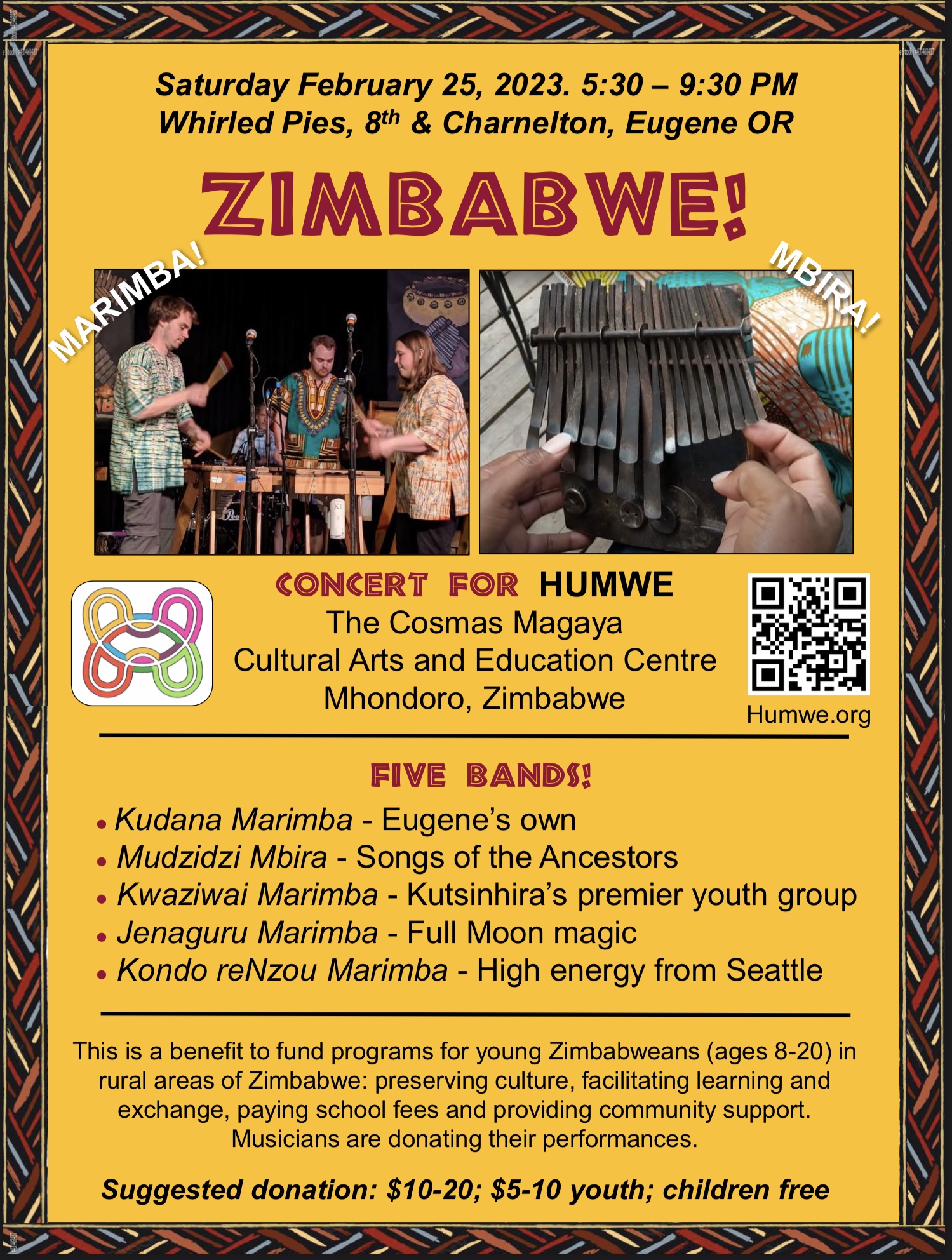Eugene Friends of Humwe present ZIMBABWE! Marimba/Mbira concert

Saturday, February 25, 2023
5:30
9:30
Suggested donation at the door: Adults $10-20 | Youth $5-$10 | Kids free
Eugene Friends of Humwe present: ZIMBABWE! Marimba/Mbira Concert for Humwe Where: Whirled Pies, 8th and Charnelton, Eugene
When: Saturday, February 25, 2023, 5:30 – 9:30 pm
What : Five talented Zim music bands! Kudana Marimba – Eugene’s Own
Mudzidzi Mbira – Songs of the Ancestors
Kwaziwai Marimba – Kutsinhira’s premier youth group Jenaguru Marimba – Full Moon Magic
Kondo reNzou Marimba – High Energy from Seattle
This is a benefit to help fund Humwe’s programs for young Zimbabweans (ages 8-20) in rural areas of Zimbabwe: preserving culture, facilitating learning and exchange, paying school fees and providing community support. Musicians are donating their services.
By Donation at the door: Suggested: $10-20 | $5-10 youth | children free
About Humwe, and its founder
In 2001, just a week before 9/11, 21-year-old Tsitsi Magaya arrived in Eugene, Oregon, to become a U.S. college student. Her father was the world-renowned Zimbabwean mbira master Cosmas Magaya, who himself had visited Eugene several times previously
while on tour with ethnomusicologist Paul Berliner and also while attending the Zimbabwean Music Festival 2000, held at the University of Oregon. He initiated a program for learning to play mbira at Kutsinhira Cultural Arts Center (https://kutsinhira.org/), a local Eugene nonprofit dedicated to the music and people of Zimbabwe.
Tsitsi had bravely left her home country to live with a Eugene family and study – first at Lane Community College and then the University of Oregon, where she graduated in 2004. She went on to earn a master’s degree in accounting and to work at several large US corporations. She eventually became a US citizen and currently lives with her family in Bentonville, Arkansas.
Tsitsi (which means “mercy” in her native language) had from the start the desire to help the people of her native country, and she was encouraged in this ambition by her father, as well as her friends and supporters at Kutsinhira Cultural Arts Center in Eugene. So as soon as her own financial stability was established, Tsitsi began to plan and establish Humwe: the Cosmas Magaya Cultural Arts and Education Centre (https://humwe.org/ ), working in her father’s rural village in the Mhondoro area of Zimbabwe.
The Shona word “humwe” means “working together to achieve a shared goal.” Through Humwe, Tsitsi and local teachers and supporters started to offer mbira, marimba and dance classes to young people in the area, under the guidance of Cosmas Magaya.
Tsitsi called together a board of directors to help her work on becoming a US 501(c)(3) nonprofit so that the goals of Humwe (Cultural Preservation, Cultural Exchange, and Community Support) could be realized in a larger way. US nonprofit status was attained by Humwe in July 2020. Just days later, we suffered the loss of our elder, inspiration, and friend, Cosmas Magaya, to the Covid-19 pandemic. Though we experienced this tragedy as a deep loss in many ways, it did not deter Tsitsi and the Humwe Board from carrying out Tsitsi’s vision; rather, we considered it now to be more urgent, because mbira had lost its champion and Zimbabwe its cultural ambassador.
Humwe has continued to offer lessons to local young people in playing marimba, mbira, and other traditional instruments, but has also expanded its programs to include young
rural students from many other areas of Zimbabwe. This is done by means of holding weeklong camps during school breaks, where students travel to Magaya village to learn and share the music. The organization has also purchased instruments to donate to local schools and paid school fees for its students. Future plans include an expansion of the music camp program, exchange visits of Humwe students with students in other areas of Zimbabwe, and the building of a small traditional village and other accommodation so that visitors from both Zimbabwe and other countries can come and learn about Shona music and culture.
